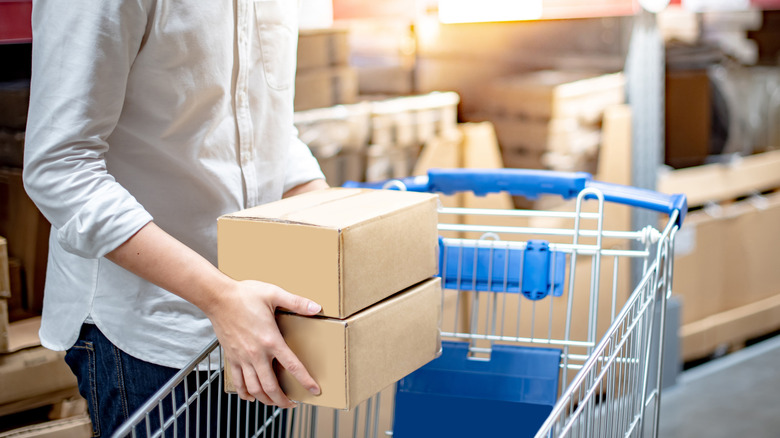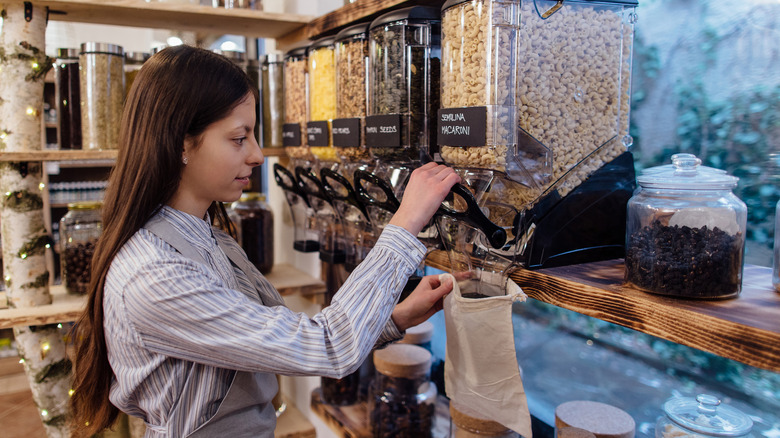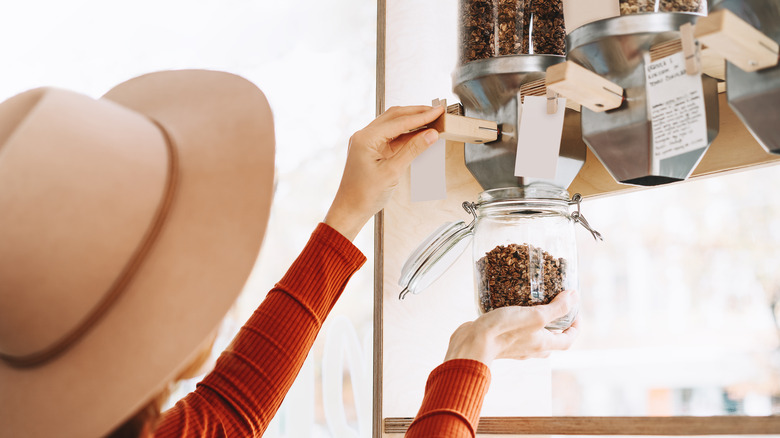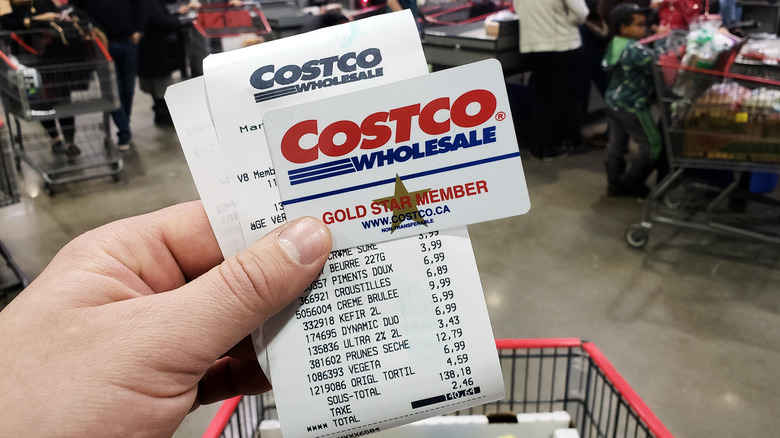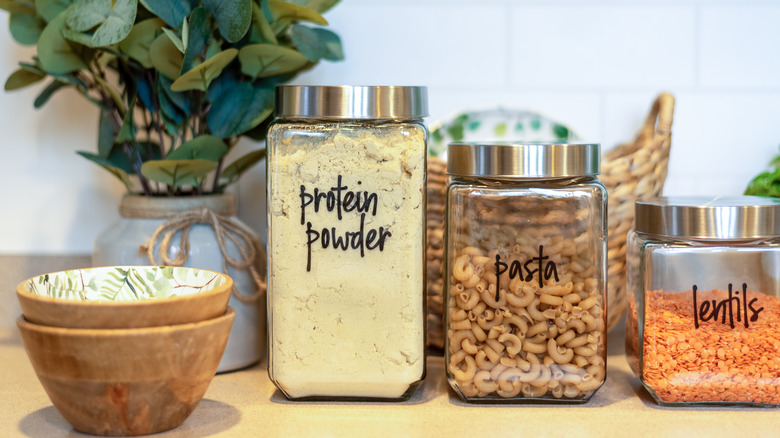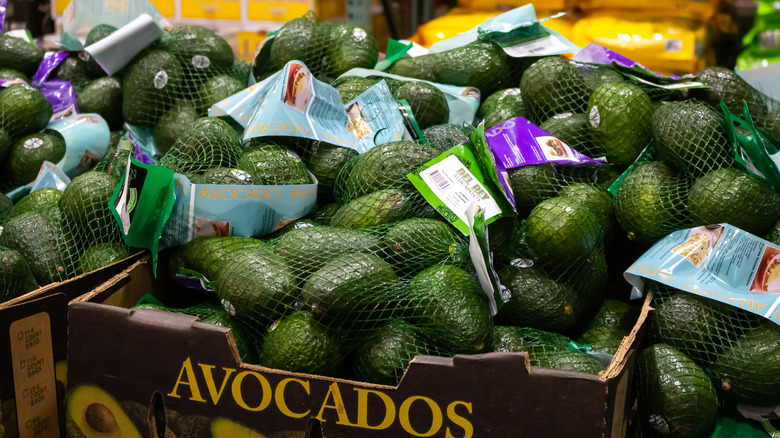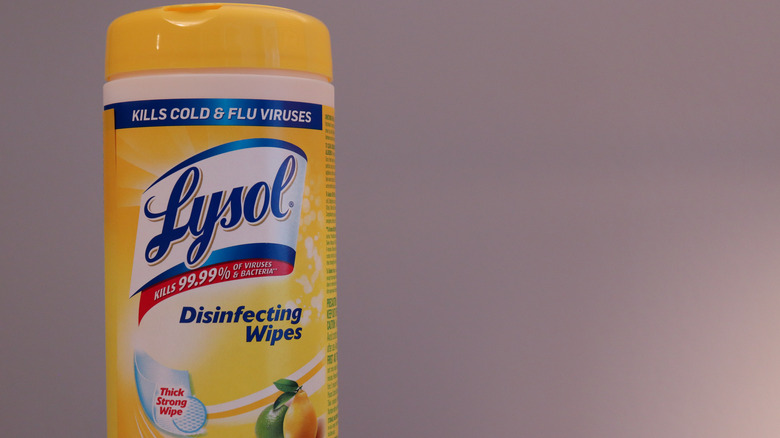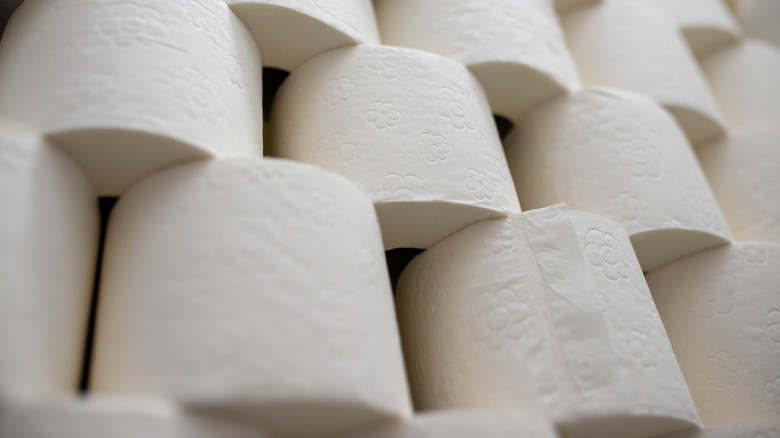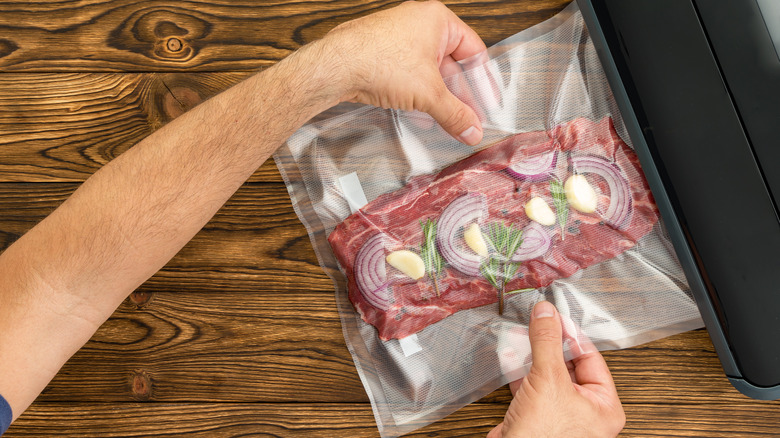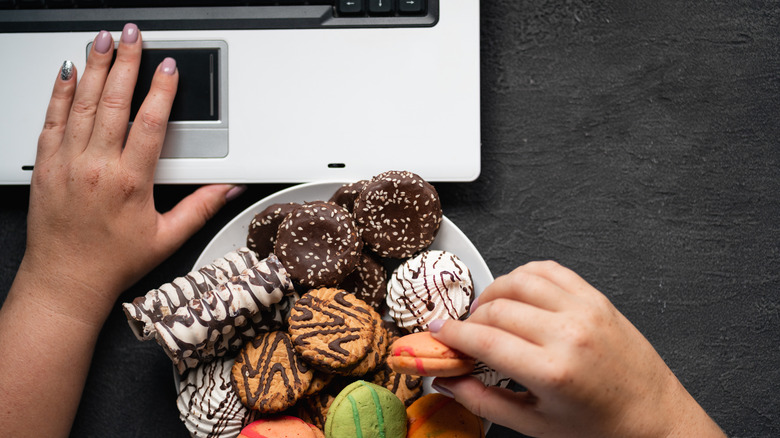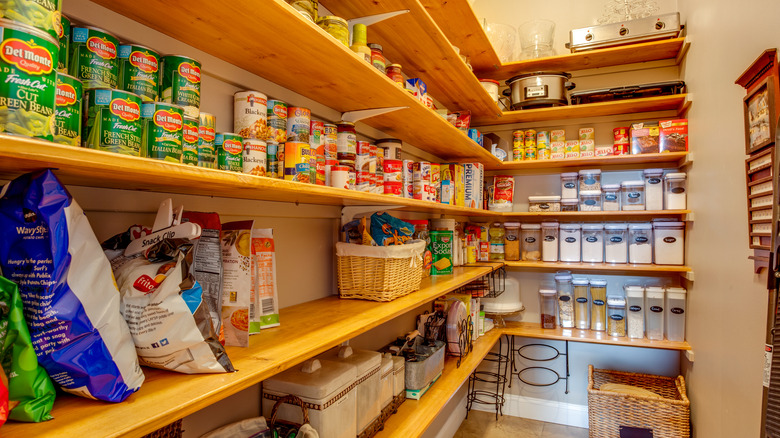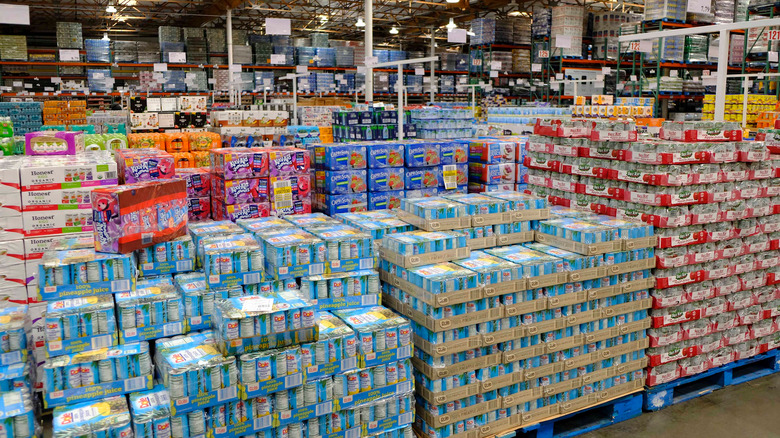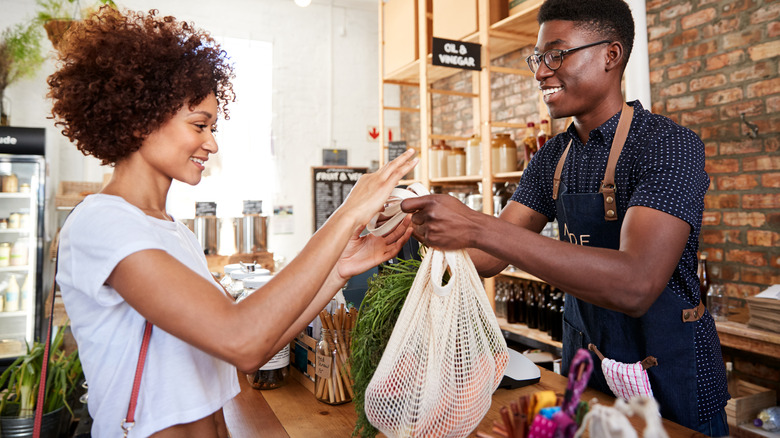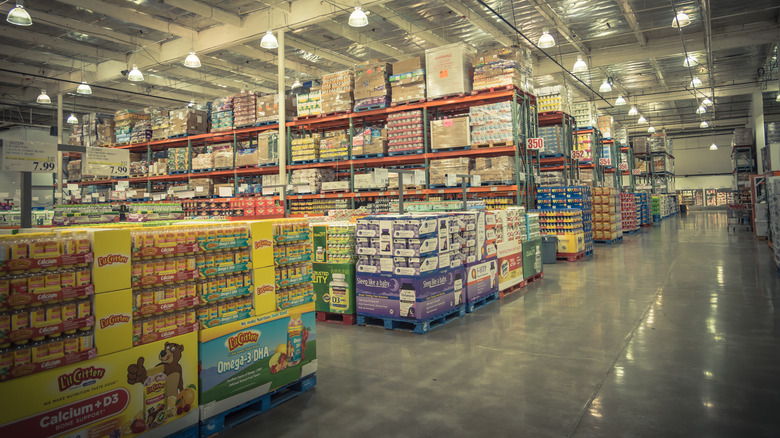What You Need To Know Before Buying In Bulk
A penny saved is a penny earned, the old saying goes, and it's absolutely true. Start saving and all those pennies add up, and it's amazing how fast small changes in your shopping habits can make a huge difference.
It's entirely possible that you might think buying in bulk is a great way to save money, and it can be. But it's also more complicated than you might think, and getting your money's worth takes more than clearing a spot in your garage or closet, then loading up your cart at your favorite big box store. We did the research — and the math — for you, and found out that if you're not careful, you could end up spending more money and wasting more things.
Let's talk about bulk buying: What should you know to make it worth your while, what pitfalls you should avoid, and are there any tricks for making the most of your bulk purchases? Now on to those bulk shopping tips and tricks.
It can more more environmentally friendly
So, here's some good news! If your family is making a conscious effort to be more sustainable and environmentally friendly, buying in bulk can make a huge difference in what you're throwing away.
According to Truly Good Foods, about 45% of America's waste is a combination of food and food packaging. That's pretty shocking, and they add this tidbit to put things in perspective: If everyone switched to buying almonds — just almonds — in bulk, it would reduce the annual amount of garbage in landfills by 72 million pounds. Back in 2012, Portland State University (via NPR) looked at the extent the nation's waste production would be impacted if everyone switched to buying bulk for just basics, and said that the results would be a staggering reduction of pressure on our landfills.
There are more environmental benefits to buying in bulk than just a reduction in plastic and packaging waste. As Green Foot Mama points out, shopping smart and buying in bulk will also reduce the number of trips you're making to the grocery store, and that, in turn, will help reduce your carbon footprint. Imagine if everyone did that!
You don't always have to go big
Let's say you're trying a new recipe that calls for a spice that you don't usually keep on hand. You're not sure if you're ever going to use it again, which means that not only does spending the money for a whole bottle of it seem like a waste, but that spice is probably going to go bad before you can use it again, right? The surprising solution? Buy in bulk.
Anna Abatzoglou of Portland State University headed up a research study on the environmental impact of bulk buying, and she told NPR that not all bulk purchases have to be huge. If you're in need of a small amount of spice, dried fruit for a single fruitcake, just a handful of nuts for a baking project, head to those bulk bins at your favorite grocery store. Not only will you not waste that leftover candied fruit or that jar of spice you'll never use again, but it'll save you a ton of money — and, she says, "You can experiment. Like, you can try different grains and you don't have to invest in a big bag."
Bulk purchases aren't always big ones!
No, it's not always the best deal
Here's the bad news: Bulk buying can end up costing you a lot more. We looked at a whole bunch of different items that we all might be tempted to buy in bulk, and found that in some cases, individual prices ended up being much higher for bulk buys.
When it comes to some kitchen staples — like cereal, canned fruit and veggies, soda, and salad dressing — it turns out that when you break down the price by the ounce or the unit, most bulk "deals" are the more expensive option. These items regularly go on sale in standard sizes in your typical grocery stores, so buying, say, smaller, individual bottles of salad dressing is actually the more cost-effective option.
When NPR did a wide-ranging price comparison on those bulk bins at several Washington, D.C. grocery stores, their findings were similar. While some items — like coffee — were a lot cheaper from the bins, some were way more expensive. When they started pricing out nuts, they found that some — namely, almonds — cost around twice as much when purchased from the bulk section. Bottom line? Keep the calculator on your phone handy, because it's not always the most cost-efficient.
The importance of inventory
There's nothing we love more than some practical hacks to make life easier. (Except, maybe for creamy chicken nachos. We do love those!)
It turns out that buying in bulk can become even more efficient with some planning. Quick, what are the last seven dinners you made? Time's up! Life can quickly turn into a busy blur, and it's not unusual to miss patterns in your own meal prep. That's why Epicurious recommends keeping a food diary for at least a few weeks. That'll allow you to spot patterns that you might not even be aware of, like how many meals you prepare using things like pasta, or how often you lean on the chili seasoning. What you should — and shouldn't — buy in bulk might surprise you.
Then, they also recommend keeping a list of what you have in storage. Not only will you know with a glance at your list when it's time to restock something, but it'll prevent those trips to the grocery store where you wonder if you have something hidden in the pantry, buy another jar, box, or bag, and then find out you have 10 pounds of it sitting in the back of a cabinet. Whoops!
Be realistic about what you can use
Look, we love Costco as much as the next person (though maybe not as much as Post Malone), but unless you're going to be hosting a party or cooking for an event, we recommend that you skip their bulk produce. Why? It tends to come in quantities that are just too big for a family to use before it goes bad. Sure, a flat of 24 apples might seem like a great idea when you're in the store, but when you're halfway through, it's going to look less awesome. How about that sack of avocados? You just know they're all going to ripen at the same time, and then what?
The same principle goes for other items that might spoil faster than you can use them. Take cooking oil. Properly stored it's fine, right? Not exactly: We found that Costco's six-quart bulk-buy cooking oil is great for restaurants, but once you open that giant bottle, it's going to go bad within three to five months.
Even if you go by expiration dates, it can be tricky. Some foods — like cheese, honey, juice, and dried pasta — can be used beyond their expiration date (as long as they're stored properly), you shouldn't be as flexible with other foods. Things like deli meats, baby formula, and even beer have taste changes and health risks associated with using them past their expiration dates. Bottom line? If you can't use it, rethink buying in bulk.
Bulk-buy cleaning supplies can be a terrible idea
Of all the safe things to buy in massive quantities, surely, cleaning supplies are on the list, right? Not so fast.
Good Housekeeping looked at how long cleaning products actually last, and found that yes, not only do they expire, but using them past their shelf life can cause some serious problems. In some cases, the chemicals can cause their plastic containers to start to break down. That can change their chemical makeup and make them less effective, and even cleaners that don't go through this process can become less potent over time.
And this can happen faster than you might expect. Laundry detergent, for example, starts to become less effective past its expiration date, which is usually only about six months to a year from when you buy it. Fabric softener only works its magic for about a year, while antibacterial cleaners are only fully effective for about a year. Disinfectants — like Lysol — start to lose their effectiveness after about two years, and dish soap is only good for a maximum of 18 months. When it comes to dishwashing liquid, that's even more short-lived and should be used within just three months. And those disinfecting wipes: Are they going to dry out before you can even use them?
When you're cleaning, you want to be using cleaners that are getting the job done like they should, right? Bulk buying cleaners might cost less money, but it could cost your family's health.
Toiletries and cosmetics expire, too
Toiletries, bathroom supplies, and cosmetics might seem like another great thing to buy in bulk, but it turns out that you shouldn't prep for the apocalypse after all.
While things like shampoo and cosmetics might not have an expiration date, Lifehacker says that they still do have a shelf life. Products like shampoo, conditioner, toothpaste, perfume, nail polish, and shaving cream tend to lose their effectiveness after two years, while moisturizers and skin creams are only good for about a year. Soap, deodorant, and mouth wash are good for a little longer — about three years — but it's still something to keep in mind, especially when it comes to rotating what you have.
Once products are opened and exposed to air, humidity, and bacteria — especially in the moist environment of a bathroom — they'll start to break down even faster. Anti-acne medication, for example, is good for just about three months. That's also true of sunscreen. Allure says that when sunscreen expires, it loses its ability to protect against sun damage — which can increase your risk of all kinds of health issues.
And what about toilet paper? There's a potential problem here, too: mold. Bathroomaholic warned that buying toilet paper in bulk could be the start of a big problem. Bulk packages generally aren't sealed as well as smaller packages, which leaves the TP open to humidity, mold, and mildew. Yikes.
Invest in a vacuum sealer
So, you've figured out what bulk foods are best for your family, and you're ready to shop. Not so fast! There's one kitchen tool that's invaluable when it comes to getting the most out of your bulk buys and keeping things fresh, and that's a vacuum sealer. While specifics vary by foods, FoodSaver says that breaking bulk buys down and vacuum sealing them will have a huge impact on the shelflife and quality of the food. If you just freeze meat, it'll keep for around six months with no changes in quality. Vacuum seal that same meat, and it'll stay "fresh" in the freezer for up to three years.
Now, the fridge. Foods like cheeses might last a few weeks in the fridge, but vacuum-sealed, that turns into four to six months. Dry goods? Store your bulk pasta and rice in vacuum-sealed bags, and instead of lasting about six months, they'll be good for the next two years.
Using a vacuum sealer will also make food prep much, much easier. Instead of having to fight with giant hunks of, say, ground beef, you can take an afternoon and vacuum seal the exact portion you need to make a dinner of chili or tacos, or, you can turn them into burgers and vacuum seal the number of patties you need for a meal. It saves space, keeps your food fresher, and helps you get the most out of your bulk buys.
It might have a negative impact on your waistline
Here's a tricky potential pitfall to buying in bulk, and it's definitely food for thought. According to US News & World Report, it's true that if you choose to buy in bulk, there's less chance you'll run out of something. But, they also warn that buying in bulk might make you use more of the products you're buying. If you know you have a gallon of shampoo, you might use a palmful instead of a dollop. That's just wasteful — and it's even worse when it comes to food.
Healthline says we make a shocking 200 food-related decisions each and every day, and most of them, we don't even register on a conscious level. When they looked at research linked to our unconscious ability to overeat, they found some fascinating things. For starters, the larger the package you're eating out of — think about those giant bulk bags of M&Ms — the more people are likely to eat in a single sitting.
They also looked at studies that examined what the impact of buying in bulk had on daily calorie intake. Participants were divided into two groups: the first was given enough snacks for four weeks, while the other was given double that. That latter group ate snacks worth a whopping 81% more calories each week, as opposed to the other group. If you're trying to make healthier snacking decisions, it turns out that bulk buying might be setting your subconscious up for failure.
Here's the line between bulk buying and hoarding
Bulk buying can get out of hand pretty quickly, especially if you love the rush of feeling like you got a good deal. (Or, especially if you hate the chaotic push-and-shove of rush hour grocery shopping.) So here's a question: What's the difference between responsible bulk buying and hoarding?
According to The Washington Post, it's all about strategy. Bulk buying, they say, is stocking up on household goods that you're going to use, but you're crossing over into hoarding territory when you see a really good bulk deal on something you don't really use ... but you buy it anyway.
Food blogger Kathryn Broullire gave them a bit of advice on how to determine whether or not a bulk buy purchase was a good one. She recommends repeating these questions to yourself: "Do I need it? Do I use it? Do I love it? Can I store it?" It's a super simple mantra, and if you can answer "No," to any one of those questions, you should probably keep that cart moving. Handy, right?
Don't forget to weigh immediate investments over long-term savings
Budgeting is tough, and there are so many things to think about, it's easy to see bulk buying as a straightforward, long-term investment that's going to make life easier in the long run. But experts over at Investopedia say it's not always that easy, and sometimes, the allure of the deal can cause some serious problems.
Let's say you've budgeted $30 for dairy products. There's a great bulk deal on yogurt, cheese, sour cream, and cream cheese, though, so you end up stocking up and spending $50. You could do the same thing on produce, or meat, and by the time you get to the checkout, you're spending, say, $100 more than your food budget.
What implications does that have? Is that food going to go on a credit card instead of paying cash, and are you going to struggle when that credit card bill comes in? Is paying for that extra food going to impact your ability to pay other bills that are coming due? Will that spiral into late fees that are negating any savings you might have seen on your bulk purchases? How much of that extra food are you going to throw away anyway? Do you really need this "great deal?"
Even if bulk buys are advertised as a great deal, they might not be. Immediate investments into bulk buys don't necessarily translate to long-term savings, and that's food for thought.
Consider setting up (or joining) a bulk buy co-op
Join a what-now? Lifehacker has a brilliant way to take advantage of bulk buy savings without the pressure to buy, store, and use a ton of products. It essentially involves teaming up with a group of friends, family members, or co-workers to share both the cost and the product.
It's surprisingly easy, and it starts with one person being put in charge of buying. They head to the store, and set up a price book that includes items, quantities, and prices. Then, they do the math and break those bulk prices down into unit prices, adding a few pennies on everyone to cover for things like their time, labor, expenses, and membership fees. Then, they combine that information into a flyer, which co-op partners can then use to "order" items.
So, say the store has a bulk pack of four giant bottles of dish soap. Instead of one person buying all of those and not using them before they expire, one person can buy that for $20, collect $5.25 from three friends, and give them the three extra bottles. They get it cheaper, the buyer gets $.75 off their dish soap, and everyone wins.
Here are some good and bad buys
What's going to be a good bulk buy for you and your family depends greatly on your personal tastes and what your meal staples are, so that's tough to define. According to The Washington Post, however, there are some things that are consistently good bulk buys that you may not have considered. Those are things like toothbrushes, razors, dental floss, office paper, light bulbs, and batteries. Imagine never running out of AAs again!
It's not all good news, though, so let's talk about bulk buys you should stay away from.
Kiplinger took a look at some of the bulk buys that — for the most part — just don't make sense from a financial standpoint, as a careful shopper can find better deals elsewhere. Those are things like the huge, 28-ounce cans of veg, cereal, eggs, paper products (like toilet paper and paper towels), big bottles of skincare products, soda, and spices. It's a list that other sites — like Reader's Digest — generally agree on, saying that these things just aren't worth the initial investment of bulk buying.
